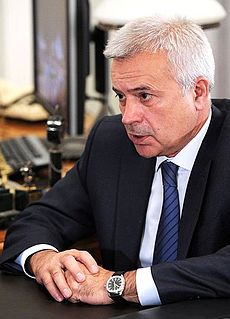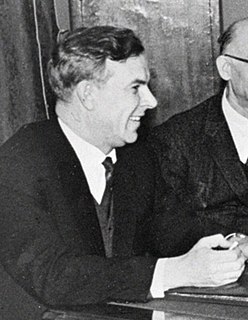A Quote by Vladimir Putin
Back in 1956, we signed a treaty and surprisingly it was ratified both by the Supreme Soviet of the Soviet Union and the Japanese Parliament. But then Japan refused to implement it and after that the Soviet Union also, so to say, nullified all the agreements reached within the framework of the treaty.
Related Quotes
However, the treaty exists and it puts us in a different position toward the Soviet Union than the one we have toward other countries. Yes, the treaty exists. Nor does it exist on only one side. Look how w3e're situated geographically and you'll see that India is very important for the Soviet Union.
This much I would say: Socialism has failed all over the world. In the eighties, I would hear every day that there is no inflation in the Soviet Union, there is no poverty in the Soviet Union, there is no unemployment in the Soviet Union. And now we find that, due to Socialism, there is no Soviet Union!
Women are the most denigrated social group in the Soviet Union. The idea of women's emancipation is only a slogan in - but also, I should say, in many places outside - the Soviet Union. But especially in the militaristic Soviet society, people only thought of life in terms of struggle and the workers' toil.
What does nonalignment mean? It means we don't belong to any military bloc and that we reserve the right to be friends with any country, independently of the influence of any country. All this has remained unchanged after the signing of the Indo-Soviet treaty, and others can say or think what they like - our policy won't change because of the Soviet Union.
The first year I was in office, only about 800 people came out of the Soviet Union, Jews. By the third year I was in office... second year, 1979, 51,000 came out of the Soviet Union. And every one of the human rights heroes - I'll use the word - who have come out of the Soviet Union, have said it was a turning point in their lives, and not only in the Soviet Union but also in places like Czechoslovakia and Hungary and Poland [they] saw this human rights policy of mine as being a great boost to the present democracy and freedom that they enjoy.
There used to be the Soviet Union and the Warsaw Pact. There used to be Soviet troops in the GDR. And we must honestly admit that they were occupation troops, which remained in Germany after WWII under the guise of allied troops. Now these occupation troops are gone, the Soviet Union has collapsed, and the Warsaw Pact is no more. There is no Soviet threat, but NATO and U.S. troops are still in Europe. What for?
KGB was inseparable part of the Soviet Union and the whole structure of the Soviet society. We believe that the achievements of the Soviet Union and of the Soviet society, it's main achievements until the split in 1991, it was at the same time the main achievements of the KGB, because it was working for the same cause.
I don't think we replaced the Soviet Union with Al Qaida. I think we replaced, we should have, Soviet Union with the merger of globalization and the IT revolution. I think it's that. That is the real challenge that we face today. Unlike the Soviet Union, it has no face, it has no missiles, but it is something that challenges every job, every city and every community.






























